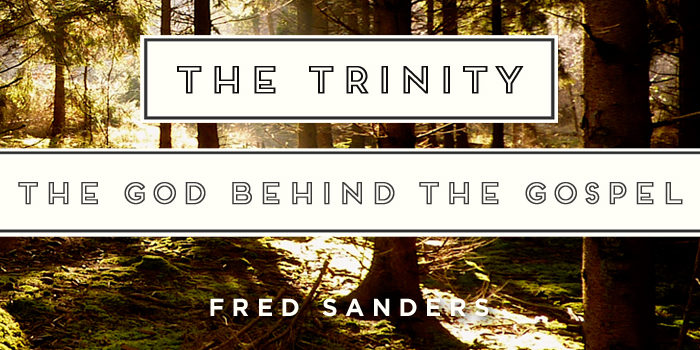
The Trinity: The God Behind the Gospel (Fred Sanders)
In the new issue of Credo Magazine, “The Trinity and the Christian Life: Why a Triune God Makes All the Difference,” Fred Sanders has contributed an article entitled, “The Trinity: The God Behind the Gospel.” Fred Sanders is Associate Professor in the Torrey Honors Institute at Biola University. He is a systematic theologian who studies and teaches across the entire range of classic Christian doctrine, but with a special focus on the doctrine of the Trinity. He is the author of The Deep Things of God: How the Trinity Changes Everything. He also blogs at The Scriptorium, and given his four volumes of theological comic books, Dr. Doctrine’s Christian Comix on the Trinity, he may be the world’s greatest systematic theologian cartoonist.
Here is the introduction to his article to get you started:
When people get saved, they don’t usually notice that something Trinitarian has happened to them. But “something trinitarian” is precisely what goes on in salvation: Everyone who has saving faith has been drawn by the Father (John 6:44) and moved by the Spirit to confess that Jesus is Lord (1 Cor. 12:3). To be forgiven is to be justified by the just One when the Father put forward his Son as a propitiation to be received by faith (Rom. 3:24-5). God’s great blessing to us in Christ is a single, massive, unified act of choosing us before the foundation of the world, redeeming us through the blood of his beloved Son, and sealing us with the Holy Spirit of promise (Eph. 1:3-14).
Wherever you turn in the doctrine of salvation, you encounter the integrated work of the Father, Son, and Holy Spirit, the concerted undertaking of a great salvation that is purposed by the Father, accomplished through the Son, and applied by the Holy Spirit. Perhaps it is never more conspicuously displayed than when we look at salvation through the lens of adoption. Here the Trinitarian character of salvation shines through constantly: the Son is not ashamed to call us brothers, but brings us into that same filial relationship with the Father that he himself has. The eternal Son becomes the incarnate Son in order to bring creatures into a sonship relation to the Father, through the indwelling Spirit of adoption. What he always has been in heaven, the one in whom the Father is well pleased, he begins to be on earth, among us, in the likeness of sinful flesh. Exalting fallen creatures into that filial relationship is not easy, and is no mere matter of course. It costs. The Father loves the world so much that he gives his Son (John 3:16), and the Son offers himself to the Father through the eternal Spirit to make this happen (Heb. 9:14). J. I. Packer has said that the theology of the New Testament can be summed up in three words: “Adoption through propitiation.” The Trinity pays the price of bringing us home to God.
Jesus himself seems to have indicated this Trinitarian depth of Christian existence when he commissioned his church to make disciples of all nations by baptizing them “in the name of the Father, Son, and Holy Spirit” (Matt. 28:20). These three names, or rather this one divine name that points to three distinct persons, is spoken over every person brought into the church. It is not merely a formula to be recited for its own sake, but a kind of summary of the gospel, explaining the depths beneath what every believer experiences in salvation. What Paul calls “the gospel of God” is a gospel about the one who was declared to be God’s Son by his resurrection through the Spirit (Rom. 1:1-4). When we encounter the gospel of God, the reality we come into contact with is the God of the gospel, and it is the task of the doctrine of the Trinity to explain that connection.
Read the rest of this article today!
The Trinity and the Christian Life: Why a triune God makes all the difference
One of the dangers every church faces is slipping, slowly and quietly and perhaps unknowingly, into a routine where sermons are preached, songs are sung, and the Lord’s Supper is consumed, but all is done without a deep sense and awareness of the Trinity. In other words, if we are not careful our churches, in practice, can look remarkably Unitarian. And such a danger is not limited to the pews of the church. As we leave on Sunday morning and go back into the world, does the gospel we share with our coworker look decisively and explicitly Trinitarian in nature? Or when we pray in the privacy of our own home, do the three persons of the Trinity make any difference in how we petition God?
In this issue of Credo Magazine, we have brought together some of the sharpest thinkers in order to bring our minds back to the beauty, glory, and majesty of our triune God—Father, Son, and Holy Spirit. But we do not merely want to see him as triune, but recognize why and how the Trinity makes all the difference in the Christian life. Therefore, in this issue Fred Sanders, Robert Letham, Michael Reeves, Scott Swain, Tim Challies, Stephen Holmes, and many others come together in order to help us think deeper thoughts about how God is one essence and three persons, and what impact the Trinity has on who we are and what we do as believers.
Matthew Barrett, Executive Editor


